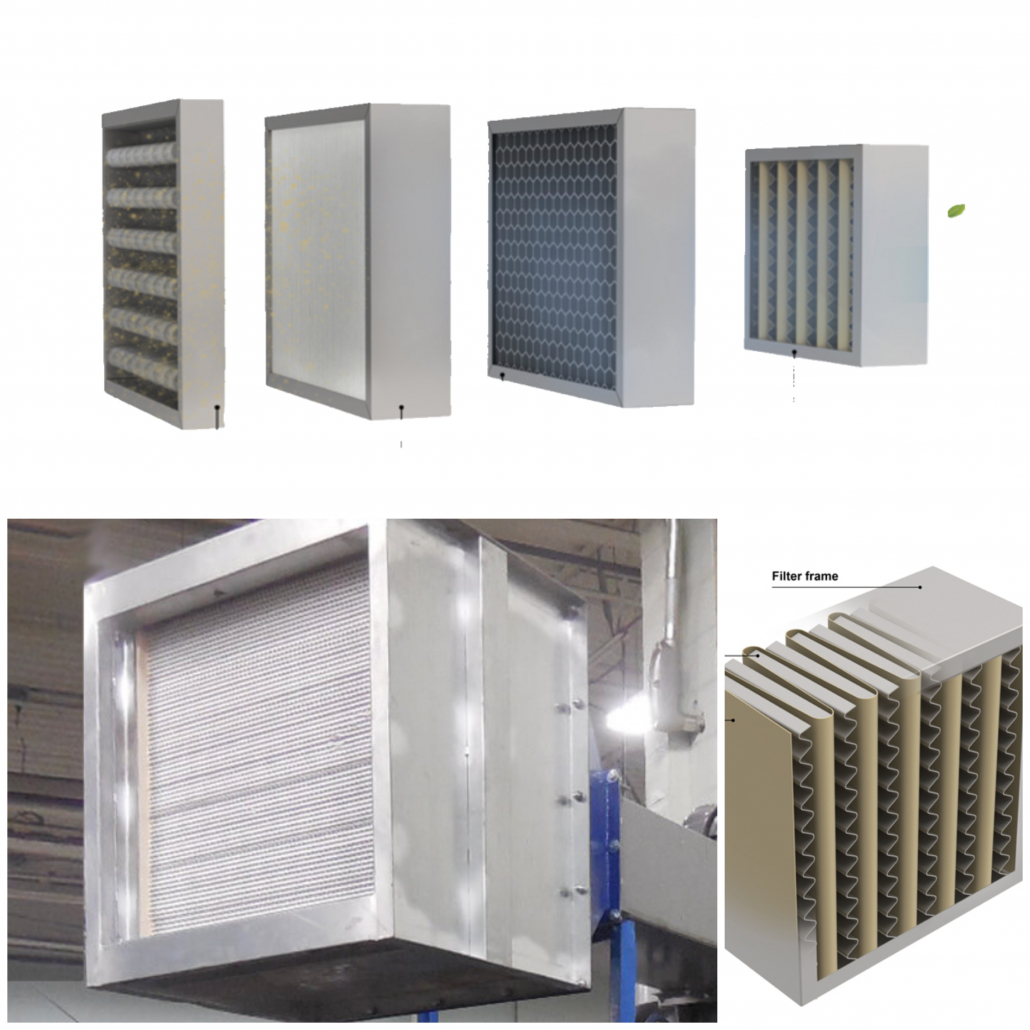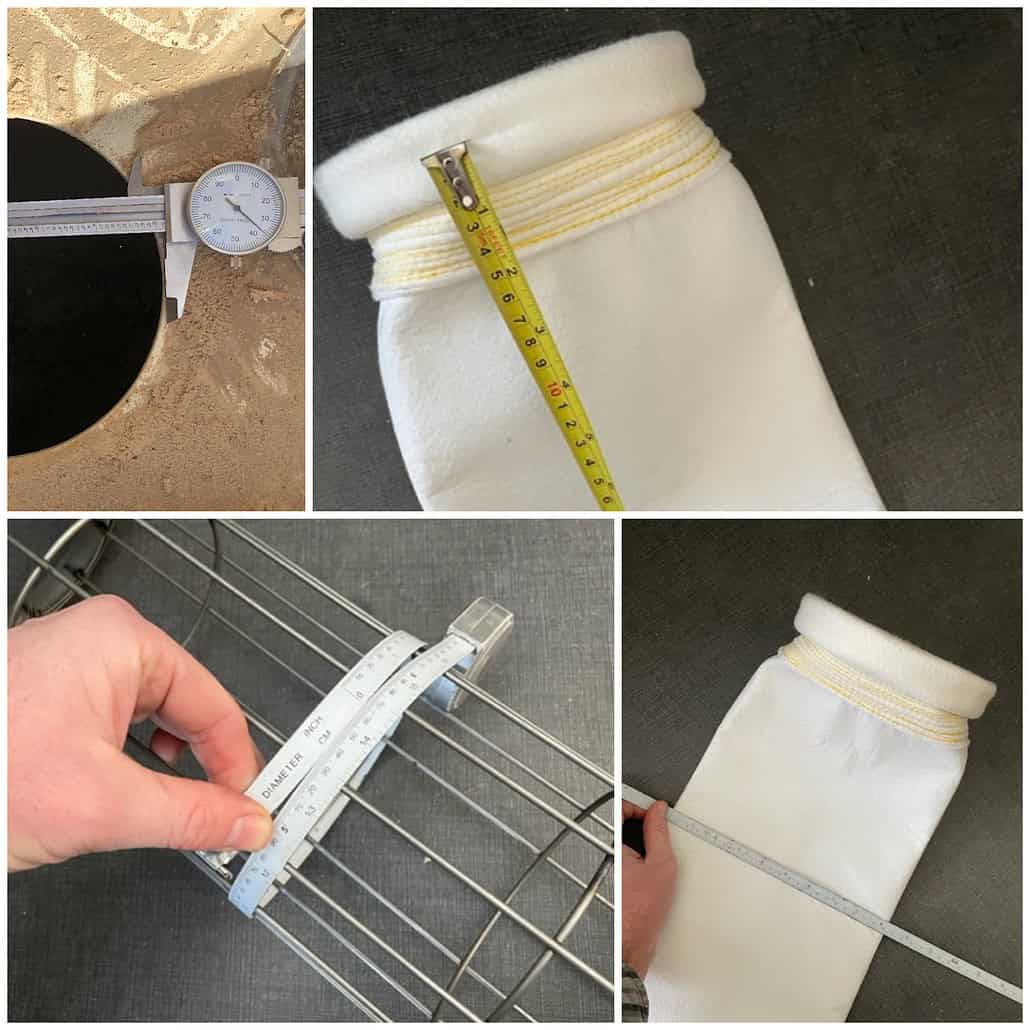In the world of industrial operations, maintaining your dust collectors in top condition can consume lots of time and resources. But investing in regular maintenance yields many advantages for productivity, product quality, employee health, compliance with safety standards, and equipment longevity:
1. Boost Productivity
Excessive dust accumulation inside your facilities or on industrial equipment poses a silent threat to productivity. If your dust collection system is underperforming due to prolonged wear and tear or if your dust collector is inadequate or undersized, it poses a significant risk to your entire operation. Filter leaks and other maintenance issues that go unchecked could lead to an unexpected plant shutdown, disrupting operations for days to weeks or more.
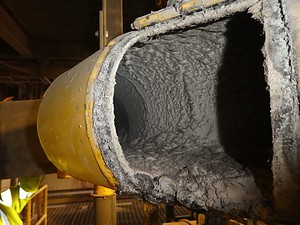
Filter leaks and other maintenance issues that go unchecked could lead to an unexpected plant shutdown, disrupting operations for days to weeks or more.
Additionally, even minor maintenance issues can have unseen impacts on your operations. Take for example a dust collection duct that slowly accumulates dust build-up. The airflow at dust pickups slowly reduces over time and fugitive dust slowly increases, costing more and more time spent on housekeeping and cleanup. Alternatively, addressing the issue with regular duct inspection and cleanouts will keep your workforce productively working on shipping product.
2. Increase Product Quality
For many manufacturing facilities, dust in the air can mean dust on their products. A robust dust collection system acts as a guardian, efficiently capturing and eliminating dust particles from the air. This not only enhances the quality of finished goods but also ensures consistency in production.
Any maintenance issue with your dust collector, fan, ductwork, cleaning system, or controls ultimately results in more unwanted dust in your facility, increasing the risk of dust on and in your products.
3. Enhance Health & Safety Standards
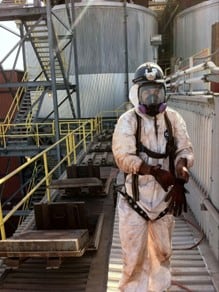
Maintenance Baghouse.com personnel performing an inspection at a plant
Industries dealing with hazardous materials emit contaminants that may pose serious health risks to employees. Inhalation of these particles can lead to both short-term and long-term health issues. For example, silica dust may expose workers to silicosis, and wood processing may expose workers to carcinogenic dust.
A well-maintained dust collection system plays a critical role in removing hazardous dust, safeguarding the comfort and long-term health of your workforce. Additionally, it mitigates the risk of fire or explosion, especially in industries susceptible to combustible dust.
4 Requirements for a Combustible Dust Explosion
- Oxygen
- Enclosed space (ductwork or a baghouse)
- Ignition source (spark or smoldering dust)
- Combustible dust dispersed at the right concentration level
4. Preserve Equipment
Manufacturing machinery is a substantial investment, and its lifespan can be significantly shortened by the accumulation of dust and debris. Dust settling on sensitive surfaces (such as computers, control boards, mechanical parts, etc.) can lead to malfunctions, resulting in frequent and costly maintenance.
A proactive approach to dust collection not only ensures the longevity of your equipment but also reduces the need for extensive and unplanned repairs.
5. Enhance Production Through Strategic Maintenance
Unlike reactive or routine maintenance, which focuses on fixing issues as they arise, strategic maintenance (also known as “planned maintenance” or “total preventive maintenance or TPM”) involves a thoughtful, long-term perspective. The first step in implementing strategic maintenance at your facility is to plan periodic inspections following a maintenance checklist tailored to your specific system.
If you have any questions or challenges specific to your industry, consult with a dust collection expert such as Baghouse.com for a comprehensive inspection to assess the efficiency and suitability of your current system. Call us now! Our experts can provide you with customized recommendations to minimize inefficiencies, ensuring your equipment works optimally and reducing maintenance costs.
In conclusion, the benefits of a well-maintained dust collection system extend far beyond mere compliance. It’s a multifaceted strategy that safeguards your investments, secures employee health, and improves your production efficiency.
Frequently Asked Maintenance Questions
How can I know if the filters are working correctly?
The main signs to know if your filters are in good condition or if they need to be replaced are whether they can be cleaned effectively or not by the baghouse, or if they start leaking. Click here to read more about filter service life.
How often should I do a filter changeout?
Baghouse filters have an average service life of 1-3 years in most applications. Some can go beyond that without major increases in emissions, while others may last less than a year in more difficult applications. The two main reasons to replace baghouse filters at the end of their life are (1) because blinded filters will begin to have higher and higher emissions (even if there are no holes) and (2) old filters have higher differential pressure (i.e. pressure drop), which decreases the airflow through the system, causing cascading effects of reduced dust collection at pickup point (fugitive dust emissions) and dust buildup in the ductwork.
Can we delegate the filter changeout to our in-house maintenance department?
Of course you can! But you want to make sure they are properly qualified for the task. With dust collection training from Baghouse.com, your maintenance technicians, maintenance planners, engineers, operators and reliability staff will be able to keep your systems running at maximum efficiency, troubleshoot any problems that may arise, and optimize the systems to meet the demands of production.
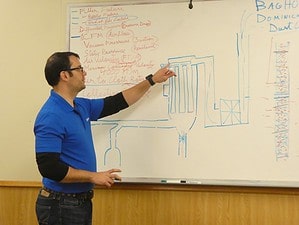
Training class tailored to maintenance, engineering and safety personnel
Can I outsource the baghouse filter changeout?
The answer is yes! However, you have to be careful who you outsource this vital task to. Inexperienced contractors often get in over their heads after accepting a contract to replace filters, only later discovering the complexity of the task. A rushed or improper installation can cause problems later due to early filter failure in some cases costing millions of dollars to replace.
Can you recommend someone for a system inspection?
Our experts can visit your facilities and perform a thorough inspection of all your baghouses. They will provide you with a comprehensive report of the things that could improve. Additionally, with a highly trained field service team, and decades of experience, you can trust Baghouse.com to do the filter service with minimal downtime.
Contact Us to Speak to One of Our Baghouse Experts.
For more baghouse related training and information, be sure to check out our Baghouse Online Training page.


